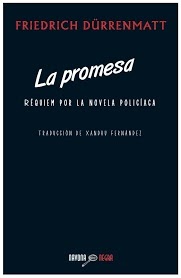
Original language: German
Original title: The promise
Translation: José María Valverde
Year of publication: 1958
Valuation: High recommendable
Rhythm is, it seems to me, an essential element in a literary work. The rhythm must adapt to what is told and how it is told, synchronized with the prose and marking the pace for the reader. There are a thousand examples of this harmony and many others of its absence, and I get the impression that this thematic week dedicated to rather short and forceful texts is closely related to rhythm, because if a book with a few pages does not manage to hit the mark ideal rhythm will almost certainly end up being disposable even if it offers other virtues.
If you see the rating I put above, you will have been able to correctly assume that this short novel by Friedrich Dürrenmatt (whose recommendation I have to thank Oriol for) hits the nail on the head with the pacing, and one could even say that it is its greatest asset. Because the story itself is rather ungroundbreaking if we consider the piles of movies and books we carry in our backpacks at this point. This is a series of crimes whose victims are girls who appear murdered and probably, it is not said explicitly, subjected to sexual violence. From there a police plot develops led by a highly trained inspector who will take the matter personally. Adding to the difficulty of the investigation are factors that make it even more arduous, such as the absolute absence of evidence, the presence of someone with every appearance of guilt, the fury of the victims’ neighbors or the petty interests of other police officers. . Nothing too special, as you can see.
But the talent for storytelling can turn a more or less conventional story into something much more valuable. There is the rhythm I referred to at the beginning, the exact cadence to maintain tension without overwhelming the reader, but there is more. A story constructed from similarly dressed girls who are murdered while wandering through a forest has the insane point of a crude reinterpretation of the tale of Little Red Riding Hood, of course, in addition to the suspicion that hovers over the inhabitants of the peaceful Swiss towns where it takes place. And certain scenes (the absurd outcome of a long surveillance, the desperate dissertation of an old woman) recall, forty years in advance, some extravagant sequences of Twin Peakswhere we also witnessed disruptive moments where the absurd arose suddenly in a context of maximum drama.
Brushstrokes that give the book a modern, novel air, a way of treating the detective novel from a different angle, thus enhancing the story. As does a slight meta-literary feature that remains a hint although it gently flies over the entire text. They are virtues that make reading very attractive and that make us forgive some small sin, such as resorting to a relative, although well prepared, deus ex machina to resolve some issue.
Being a more or less brief text that manages to capture all the attention with hardly any moments of relaxation, it seems to me that it embodies this concept of piranha novel, whatever that is, to which we wanted to dedicate these pre-Christmas entries. And hey, for a not very expensive gift with a guarantee of success it is also very valid.
Source: https://unlibroaldia.blogspot.com/2023/12/novelas-pirana-2-la-promesa-de.html


